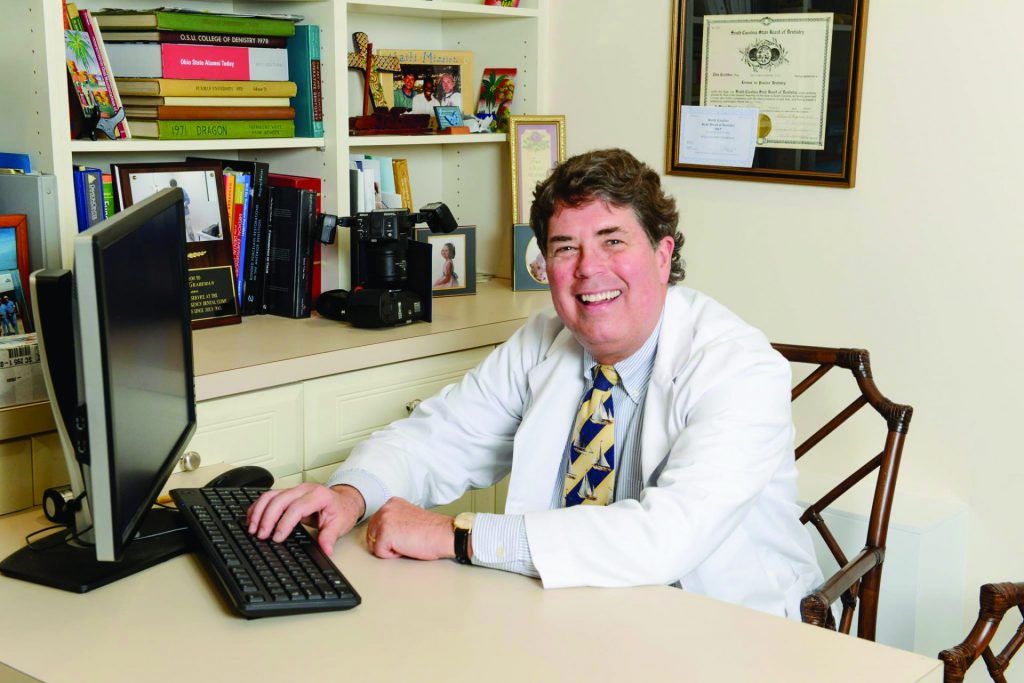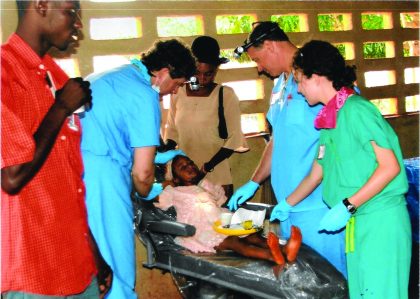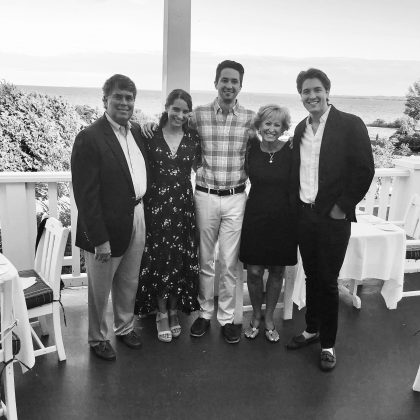
Subscribe to our newsletter
Enter your email address below and subscribe to our newsletter

David grew up in Ohio surrounded by family. Although he loves his hometown roots, he wanted a change for his college and thought a southern school would be fun. He received his undergrad in 1975 from Furman University where he studied biology. He always wanted to go into the medical field but was not sure at first what his specialty would be. David’s father was a dentist and thought he also might enjoy dentistry more than medicine. He returned to Ohio once he decided to enroll in Dental School. It turns out he was right, he loves dentistry.
After completing all of his training, Dr. Grabeman moved to the Grand Strand. He worked closely with a dentist who had practices in Georgetown and Andrews. David fell in love with Georgetown immediately. He was heavily involved with the downtown revitalization in the 80s and was even president of the organization for a couple of years. After seven years, his predecessor passed away and David inherited the business. In 2002, he decided to move his practice to Pawleys Island where it is still located now. Although his heart was in Georgetown, a majority of his patients were from Pawleys Island, so business-wise, it made more sense.
David met his wife, Linda, when he moved to South Carolina while attending a friend’s wedding. Both David and Linda were in the wedding party as it was both of their best friends who were getting married. David and Linda have been married for 38 years and have two sons and a daughter. When I asked Dr. Grabeman what “seeds” he has planted that he hopes will someday “bloom,” his first thought was about his children. He explained that although they are still in the process of blooming, having the ability to watch them grow is a great accomplishment in itself.
Another seed I would say that has blossomed well is his mission work in Haiti. A few friends from church approached David about this venture, and although he was hesitant at first, he is so glad he finally said yes. He quotes, “Initially, I resisted this call to serve until, I believe, Jesus exhausted my excuses and I felt I had to go. I had many fears such as the food, the loss of my ‘first world’ creature comforts in a ‘third world’ country, the potential of contracting an infectious disease, and the physical rigors. To my great amusement, Jesus relieved these fears with protection, comfort, and great joy and happiness I cannot explain.” Dr. Grabeman has been traveling to Haiti for about 22 years now and says every trip is an incredible experience.
For a while, they only had one trip a year, but due to more people getting involved with the ministry, it has turned into three trips a year. Besides the doctors who go, they always have a group of volunteers from our local area. Most of these folks go intending to help even though they do not have a background or knowledge of what they are helping with. A good friend of David’s has been traveling alongside him for 20 years who does not have any medical training. He is an engineer, but over time, has learned how to help Dr. Grabeman with the process. They also employ about five or six translators for every trip. There is no electricity and no running water. They can only take so much food before it expires, and they cook everything over a charcoal fire. They travel to an island off of Haiti, La Gonave, and proceed up the mountains to a village called LoTore.
 In the morning, the Haitians are always lined up waiting to be seen. They travel all night to get to this village awaiting the doctors and their help. The greatest need is to take care of their pain and infection and the best way to do that is to extract the teeth that are giving them problems. This is the majority of the work Dr. Grabeman is able to do while abroad. It may sound kind of primitive for our country, but the two countries are radically different. They are grateful to just get rid of the tooth that has been causing them pain for so long. He also helps the children with preventative measures such as fluoride treatments and packets of toothbrushes, toothpaste, and floss.
In the morning, the Haitians are always lined up waiting to be seen. They travel all night to get to this village awaiting the doctors and their help. The greatest need is to take care of their pain and infection and the best way to do that is to extract the teeth that are giving them problems. This is the majority of the work Dr. Grabeman is able to do while abroad. It may sound kind of primitive for our country, but the two countries are radically different. They are grateful to just get rid of the tooth that has been causing them pain for so long. He also helps the children with preventative measures such as fluoride treatments and packets of toothbrushes, toothpaste, and floss.
Dr. Grabeman and his team did not have an original goal set in mind other than to go and help as they can, but over the last two decades, they have come a long way. It started as dental work, but it has expanded. Now, they offer an eye clinic, an OB/GYN clinic, and both pediatric and adult medicine. They also have an animal clinic and assist with agricultural improvements. Another drastic help has been from All Saints Church. They work closely with the ministers on the island for a better understanding of how to help. There used to be no water available and they would typically travel 5 miles down a mountain with buckets and 5 miles back up. Now, there are wells put in place for clean water. The only building that existed before was made of palm fronds woven together. Now, there is a permanent building for both the church and school. All Saints supports the school and pays for the teachers’ salaries and needed supplies.
The trips to Haiti have come to a halt this year due to the coronavirus, but David is looking forward to returning when able. As far as “Teeth Spring Cleaning” for everyone in general, Dr. Grabeman shared some tips with me. He said, “While getting to the root of the problem, there are two essential things to keep in mind for healthier teeth. For one, electric toothbrushes are much more effective and do a better job than manual ones. The second is making sure you are keeping up with flossing. Oral health is closely related to overall body health and is much more connected than most of us might think. If you are not keeping up with your oral hygiene, an excess amount of bacteria can lead to gum disease. This issue is linked to multiple organs in the body, but most importantly, it directly affects the heart and can cause coronary artery disease.”
David truly enjoys helping others and his work as a dentist. Although it is hard for him to find time to relax, he enjoys golfing and boating with his family. The thing is, dentistry is also his hobby. A cousin of his who is a dentist mentioned one time that his profession is a “hobby.” At first, David thought it was a strange way to describe it, but now after so many successful years, he understands it and agrees. He says, “when I wake up, I can’t wait to get to work. It is always something I look forward to. Every patient is different, and every day is a new challenge, which excites me. I get to work with an awesome staff and help patients who have become friends. It’s more like a social hour for me now.”
 Dr. Grabeman believes that like most things in life, including our oral hygiene habits, we absolutely reap what we sow. He thinks our minds really are like a garden. He says, “whatever you plant is what is going to grow. So, if you’re planting good thoughts and reading uplifting books, I think you’re then going to plant those seeds of life and well-being in your mind. And then conversely, if you’re planting bad thoughts and habits, it will bear bad fruit. What we put into our body and mind will, of course, affect what grows in our individual gardens.”
Dr. Grabeman believes that like most things in life, including our oral hygiene habits, we absolutely reap what we sow. He thinks our minds really are like a garden. He says, “whatever you plant is what is going to grow. So, if you’re planting good thoughts and reading uplifting books, I think you’re then going to plant those seeds of life and well-being in your mind. And then conversely, if you’re planting bad thoughts and habits, it will bear bad fruit. What we put into our body and mind will, of course, affect what grows in our individual gardens.”